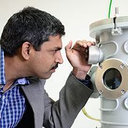Isolation and evaluation of native cellulose degrading microorganisms for efficient bioconversion of weed biomass and rice straw.
Nøgleord
Abstrakt
Cellulose decomposing microorganisms (CDMs) are important for efficient bioconversion of plant biomasses. To this end, we isolated seven fungal isolates (Aspergillus wentii, Fusarium solani, Mucor sp., Penicillum sp., Trichoderma harzaianum, Trichoderma sp.1 and Trichoderma sp.2) and three bacterial isolates (bacterial isolate I, II and III) from partially decomposed farm yard manure, rice straw and vermicompost, and evaluated them for decomposition of rice straw (Oryza sativa), Ipomoea camea and Eichhornia crassipes biomass. CDMs inoculation, in general, reduced the composting period by 14-28 days in rice straw, 14-34 days in Eichhornia and 10-28 days in Ipomoea biomass over control. Of the 10 CDMs tested, Mucor sp. was found to be the most effective as Mucor-inoculated biomass required minimum time, i.e. 84, 68 and 80 days respectively for composting of rice straw, Eichhornia and Ipomoea biomass as against 112, 102 and 108 days required under their respective control. CDMs inoculation also narrowed down the C:N ratio of the composts which ranged from 19.1-22.7, 12.9-14.7 and 10.5-13.1 in rice straw, Eichhornia and Ipomoea biomass respectively as against 24.1, 17.1 and 16.2 in the corresponding control treatments. Aspergillus wentii, Fusarium solani, Mucor sp., and Penicillum sp. were found most effective (statistically at par) in reducing C:N ratio and causing maximum loss of carbon and dry matter in composted materials. These benefits of CDMs inoculation were also accompanied by significant increase in NPK contents in the composted materials.



